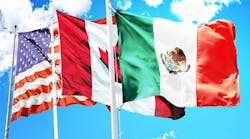The largest U.S. retail associations called on new Trade Representative Robert Lighthizer to support the North American Free Trade Agreement, aiming to salvage an accord that has come under fire from his boss.
Leaders of the American Apparel & Footwear Association, the National Retail Federation, Retail Industry Leaders Association and U.S. Fashion Industry Association sent a letter to Lighthizer on Tuesday urging him to tread lightly on the 23-year-old pact. NAFTA supports hundreds of thousands of U.S. textile and clothing jobs, along with retail operations in all 50 states, the organizations said.
“We agree that the agreement should be updated to reflect today’s business reality and better prepare for future trade patterns,” the groups said in the letter. “However, we ask for support from the administration to ensure that renegotiation will ‘do no harm’ to the successful supply chains that we rely on today.”
Lighthizer was sworn in on May 15, clearing the way for the administration to seek an overhaul of NAFTA. President Donald Trump called the treaty a “disaster” during the election campaign and has threatened to withdraw from the agreement with Mexico and Canada if renegotiated terms aren’t favorable enough.
In a draft letter circulated in March that laid out its goals, the administration told lawmakers it wanted to strengthen the U.S. manufacturing base and “level the playing field” with its NAFTA trading partners on tax treatment. Retailers, which rely heavily on imports, have opposed any changes that would tax imports at a higher rate.
‘Broad Consensus’
“Our approach is if you look across the textile, apparel and footwear industry, there’s a very broad consensus that NAFTA works -- that it creates jobs, that there’s a supply chain that supports workers and communities on both sides of the border,” Steve Lamar, executive vice president of the AAFA, said in an earlier interview. “Perhaps it can be improved, but we don’t want to start the negotiations from the perspective that this is a bad agreement.”
Retail groups say NAFTA could be updated to account for digital commerce, which was virtually nonexistent when the agreement was enacted in 1994.
“The ultimate concern for the business community at large is the failure to come to a deal that ends in the U.S. pulling out of NAFTA,” said Jonathan Gold, vice president of supply chain and customs policy at the NRF. “We don’t think that should be on the table.”
An imperiled NAFTAa comes during a challenging time for apparel retailers. Falling prices, increased competition and a lack of style trends have made it harder for clothing companies to maintain sales and profit. Now they may lose access to Mexico, a country that supplies goods at prices Americans are willing to pay.
If the trade deal changes, apparel trade groups say the industry could be faced with rising costs and another blow to its already-fragile profit margins. Mexico is the largest Latin American supplier of apparel products to the U.S. and the fifth-biggest worldwide -- behind countries like China and Vietnam -- according to the U.S. Department of Commerce.
“A renegotiated NAFTA needs to enhance the economic cooperation with these key trading partners,” the retail groups said in the letter. “Any improvements should provide for seamless integration with the existing NAFTA agreement.”
By Lindsey Rupp



